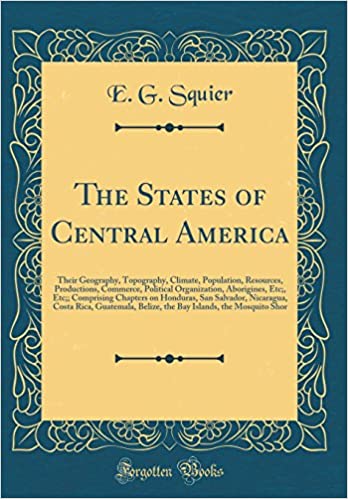
Ephraim George Squier, an archaeologist from New York, had a significant role in Latin American history. In fact, he is one of the first to attempt to enforce United States influence on Latin America. Furthermore, he published The States of Central America in 1858, which is known as one of the first attempts to present Latin American geography, people, and resources. His contact with Latin America came through several diplomatic posts he held. For example, during the 1850s, Squier served as Secretary of the Honduras Interoceanic Railway Company, in which its goal was ultimately unsuccessful. The States of Central America contains Squier’s perspective on proposing the Honduras Interoceanic Railway.
The idea to build this railway came to Squier in 1850 when he visited the Gulf of Fonesca, which borders El Salvador, Honduras, and Nicaragua. With the help of a few supporters, Squier sought to explore the Honduran terrain. It is important to note that Squier and his supporters were interested in more than primarily a railway in Honduras. Squier believed that Honduras, as well as many other Latin American countries, would eventually fall under control of the United States. By building the Interoceanic Railway, he hoped to acquire enough land for this belief to come true.
After becoming familiar with the topography of Honduras, which is detailed in The States of Central America, he contacted government officials to further his plan. He met with the Honduran president of the time, José Trinidad Cabañas, who also advocated for United States influence in Latin America. Squier used this support to his benefit and after two months of negotiations, this resulted in a charter granting the right to construct an interoceanic railway throughout Honduras. Feeling rather ambitious, Squier suggested to Cabañas that Honduras could be annexed to the United States. However, Squier later found that Honduras would be more willing to build this railway without the suspicion annexation to the United States. Due to the news of Squier’s operations in Honduras and the fear of the United States, there was a growing hostility towards the railway enterprise. In essence, Squier’s plan failed due to this hostility and because he invested many years into the project and was not reaching the goals he had imagined.
While Squier failed in his plan to construct the Honduran Interoceanic Railway, his efforts are deemed important. His efforts demonstrate the depth of foreign influence on Latin America during the 1850s. The Honduran president himself believed in United States influence in Latin America. Interestingly, while many Hondurans were originally fearful of Squier since he was from the United States, many ultimately viewed him as Honduras’ greatest foreign friend. Hondurans believed that his interest in constructing the railway was in the best interest of the republic. Even though Squier had many intentions, this element of solidarity between the United States and Honduras is important to note.
Works Cited:
Stansifer, C. (1966). E. George Squier and the Honduras Interoceanic Railroad Project. The Hispanic American Historical Review, 46(1), 1-27. doi:10.2307/2510598
Squier, Ephraim G. (1858). The States of Central America. New York: Harper and Brothers Publishers, Franklin Square.
